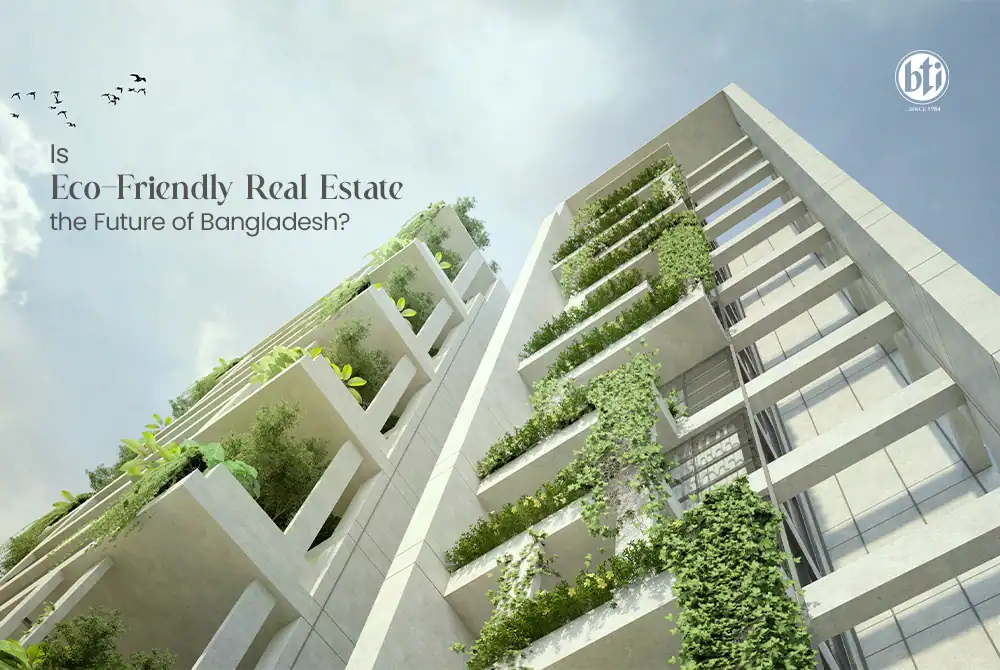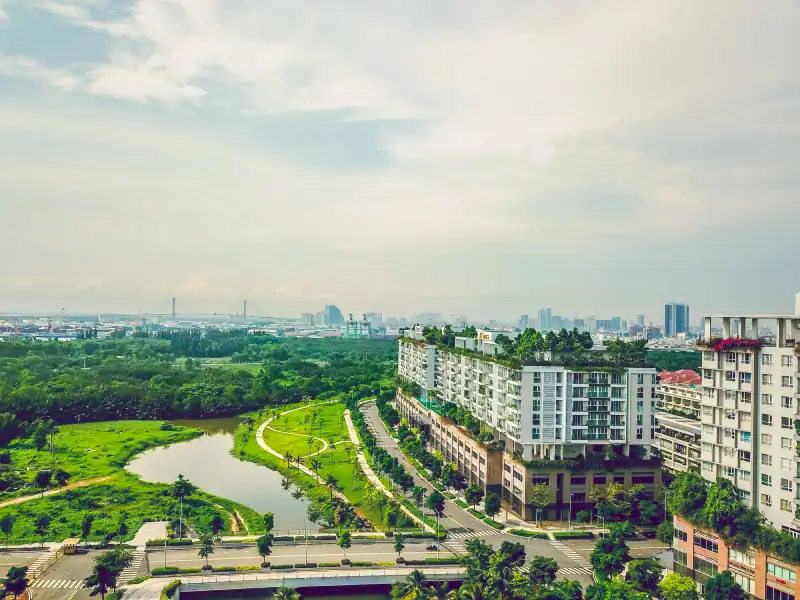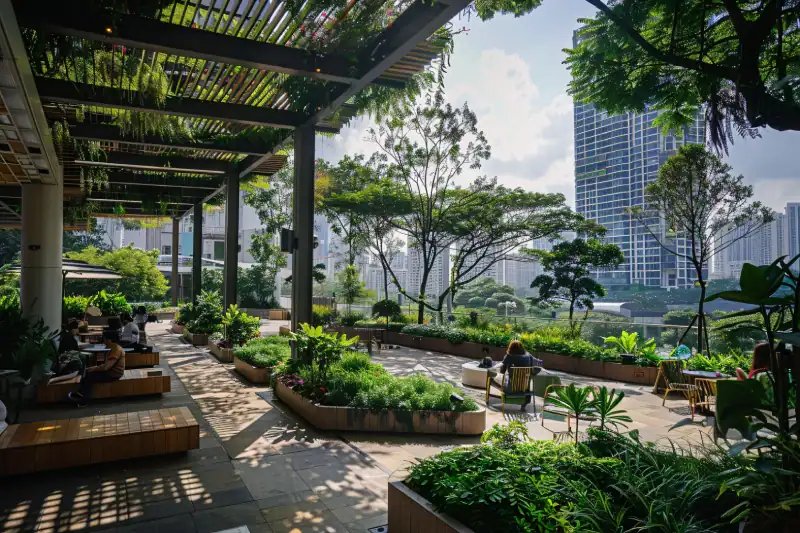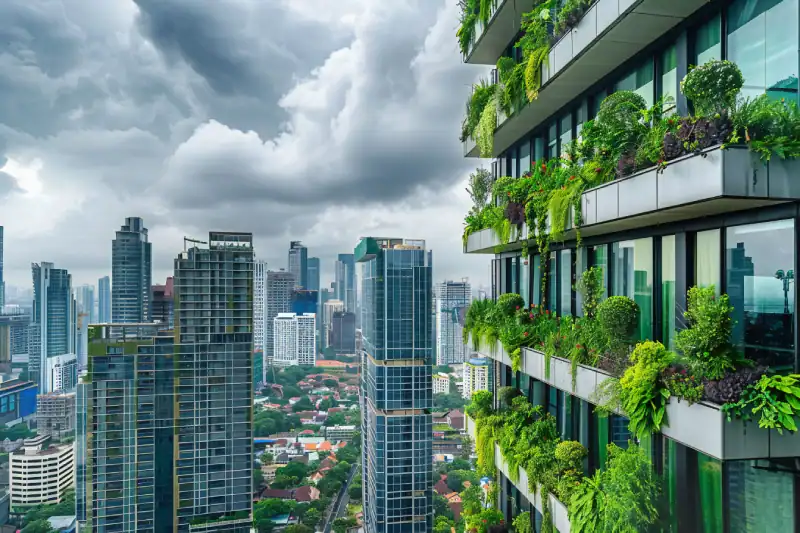
In recent years, Bangladesh has been witnessing a significant shift in its real estate sector. From rapid urbanization to the growing demand for modern living spaces, the industry has continuously evolved to meet the needs of its people. However, as the nation faces growing challenges such as climate change, energy shortages, and environmental degradation, a new question arises: Is eco-friendly real estate the future of Bangladesh?
The answer appears to be a resounding yes. With rising awareness about sustainability and the pressing need for environmentally conscious development, eco-friendly real estate is no longer just an option—it is becoming a necessity.
What is Eco-Friendly Real Estate?
Eco-friendly real estate refers to properties designed and developed with sustainability at their core. These projects aim to minimize environmental impact by using green building materials, energy-efficient systems, renewable energy sources, water conservation methods, and sustainable landscaping. They prioritize healthier living environments while ensuring reduced carbon footprints.
Globally, eco-friendly buildings are often certified by standards like LEED (Leadership in Energy and Environmental Design) or EDGE (Excellence in Design for Greater Efficiencies). In Bangladesh, too, developers are increasingly adopting similar practices to align with global standards and meet the demands of environmentally conscious buyers.
Why Eco-Friendly Real Estate Matters in Bangladesh

1. Climate Change and Rising Environmental Concerns
Bangladesh is one of the countries most vulnerable to climate change. Rising sea levels, unpredictable weather patterns, and frequent floods highlight the urgent need for sustainable practices. By adopting eco-friendly construction methods, the real estate industry can play a pivotal role in reducing environmental damage.
2. Urbanization and Energy Demand
With nearly 170 million people and one of the fastest-growing urban populations, Bangladesh’s cities are under immense pressure. Traditional real estate developments consume enormous amounts of energy and water, contributing to pollution and resource depletion. Eco-friendly real estate helps ease this burden through efficient energy use, rainwater harvesting, and solar solutions.
3. Healthier Living Environments
Eco-friendly homes emphasize natural lighting, ventilation, and non-toxic materials. This ensures cleaner air, better thermal comfort, and reduced health risks. In a densely populated country like Bangladesh, where pollution levels are often high, this is a major advantage for families seeking healthier lifestyles.
4. Global and Local Market Demand
Homebuyers today are becoming more aware of sustainability. Both millennials and future generations are showing interest in properties that not only provide comfort but also reflect environmental responsibility. For developers, investing in eco-friendly projects is also a way to stay competitive in the global market.
Key Features of Eco-Friendly Real Estate
To understand why it’s shaping the real estate future of Bangladesh, let’s explore some common features of eco-friendly properties:

- Green Building Materials: Use of locally sourced, non-toxic, and recyclable materials to reduce environmental harm.
- Energy Efficiency: Incorporation of solar panels, LED lighting, and smart energy systems to cut down on electricity use.
- Water Conservation: Rainwater harvesting systems, low-flow fixtures, and wastewater recycling.
- Waste Management: Facilities for recycling and composting to reduce landfill waste.
- Sustainable Landscaping: Green rooftops, vertical gardens, and plantations that improve biodiversity and reduce heat absorption.
- Indoor Air Quality: Low-VOC paints, large windows, and natural ventilation systems for healthier indoor spaces.
Current Scenario in Bangladesh
The real estate sector in Bangladesh has already started embracing sustainability. A growing number of projects are being developed with green certifications, and commercial spaces in Dhaka are integrating eco-conscious designs to appeal to multinational companies. For instance, several corporate towers have earned LEED Gold certification, showcasing how international standards are being adopted locally.
Residential projects too are catching up. Developers are introducing rooftop gardens, solar energy, and energy-efficient appliances to attract environmentally aware customers. While the transition is gradual, it’s clear that eco-friendly features are no longer luxuries—they are becoming selling points.
Challenges Facing Eco-Friendly Real Estate in Bangladesh
Despite the progress, there are certain challenges that could slow down the adoption of eco-friendly practices:
- Higher Initial Costs – Sustainable materials and technologies often require higher upfront investment, making eco-friendly projects more expensive initially.
- Limited Awareness – Many homebuyers are still unaware of the long-term savings and benefits of eco-friendly real estate.
- Lack of Skilled Workforce – Designing and constructing sustainable buildings require specialized knowledge, which is still developing in Bangladesh.
- Policy and Regulation Gaps – While there are some green building guidelines, more robust government policies and incentives are needed to encourage wider adoption.
Opportunities Ahead
Despite these challenges, the opportunities far outweigh the hurdles. Here’s why eco-friendly real estate is poised to dominate the real estate future of Bangladesh:
- Long-Term Cost Savings: While the initial investment is higher, homeowners benefit from lower utility bills due to energy and water efficiency.
- Government Incentives: As global sustainability goals intensify, Bangladesh is likely to introduce stronger policies and incentives for green construction.
- Investor Attraction: International investors often prefer eco-friendly projects, as they align with ESG (Environmental, Social, Governance) standards.
- Enhanced Brand Value for Developers: Real estate companies that pioneer sustainable projects will stand out as leaders in the industry.
The Road Ahead: Is Eco-Friendly Real Estate the Future of Bangladesh?

The short answer is yes. The growing need for sustainability, combined with urban challenges and changing buyer preferences, makes eco-friendly real estate not just a trend but the future of the sector. Developers who embrace this shift today will be at the forefront of tomorrow’s market.
Bangladesh, with its unique environmental challenges and rapid urbanization, cannot afford to ignore sustainability in real estate. By integrating eco-friendly practices now, the country can build cities that are not only modern but also resilient, healthy, and future-ready.
Eco-friendly real estate is steadily transforming the way properties are designed, built, and lived in Bangladesh. It offers a win-win scenario: healthier lifestyles for residents, reduced environmental impact for the nation, and long-term financial benefits for both homeowners and developers.
While challenges remain, the direction is clear. The real estate future of Bangladesh lies in sustainability. Eco-friendly projects will no longer be an exception but the standard, shaping a greener, smarter, and more resilient tomorrow.